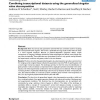Free Online Productivity Tools
i2Speak
i2Symbol
i2OCR
iTex2Img
iWeb2Print
iWeb2Shot
i2Type
iPdf2Split
iPdf2Merge
i2Bopomofo
i2Arabic
i2Style
i2Image
i2PDF
iLatex2Rtf
Sci2ools
131
click to vote
BMCBI
2008
2008
Combining transcriptional datasets using the generalized singular value decomposition
Background: Both microarrays and quantitative real-time PCR are convenient tools for studying the transcriptional levels of genes. The former is preferable for large scale studies while the latter is a more targeted technique. Because of platform-dependent systematic effects, simple comparisons or merging of datasets obtained by these technologies are difficult, even though they may often be desirable. These difficulties are exacerbated if there is only partial overlap between the experimental conditions and genes probed in the two datasets. Results: We show here that the generalized singular value decomposition provides a practical tool for merging a small, targeted dataset obtained by quantitative real-time PCR of specific genes with a much larger microarray dataset. The technique permits, for the first time, the identification of genes present in only one dataset co-expressed with a target gene present exclusively in the other dataset, even when experimental conditions for the two ...
Related Content
| Added | 08 Dec 2010 |
| Updated | 08 Dec 2010 |
| Type | Journal |
| Year | 2008 |
| Where | BMCBI |
| Authors | Andreas W. Schreiber, Neil J. Shirley, Rachel A. Burton, Geoffrey B. Fincher |
Comments (0)

